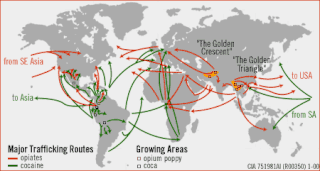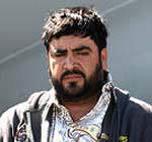A drug cartel is a criminal organization composed of independent drug lords who collude with each other in order to improve their profits and dominate the illegal drug trade. Drug cartels form with the purpose of controlling the supply of the illegal drug trade and maintaining prices at a high level. The formations of drug cartels are common in Latin American countries. Rivalries between multiple drug cartels cause them to wage turf wars against each other.

The illegal drug trade or drug trafficking is a global black market dedicated to the cultivation, manufacture, distribution and sale of prohibited drugs. Most jurisdictions prohibit trade, except under license, of many types of drugs through the use of drug prohibition laws. The think tank Global Financial Integrity's Transnational Crime and the Developing World report estimates the size of the global illicit drug market between US$426 and US$652 billion in 2014 alone. With a world GDP of US$78 trillion in the same year, the illegal drug trade may be estimated as nearly 1% of total global trade. Consumption of illegal drugs is widespread globally and it remains very difficult for local authorities to reduce the rates of drug consumption.
Narcoterrorism, in its original context, is understood to refer to the attempts of narcotics traffickers to influence the policies of a government or a society through violence and intimidation, and to hinder the enforcement of anti-drug laws by the systematic threat or use of such violence. As with most definitions of terrorism, it typically only refers to non-state actors.

Narco-state is a political and economic term applied to countries where all legitimate institutions become penetrated by the power and wealth of the illegal drug trade. The term was first used to describe Bolivia following the 1980 coup of Luis García Meza which was seen to be primarily financed with the help of narcotics traffickers. Other well-known examples are Honduras, Guinea-Bissau, Mexico, Myanmar and Syria, where drug cartels produce, ship and sell drugs such as captagon, cocaine, heroin and marijuana.
Literary fiction, mainstream fiction, non-genre fiction, serious fiction, high literature, artistic literature, and literature are labels that, in the book trade, refersto market novels that do not fit neatly into an established genre ; or, otherwise, refer to novels that are character-driven rather than plot-driven, examine the human condition, use language in an experimental or poetic fashion, or are simply considered serious art.
A narcocorrido is a subgenre of the Regional Mexican corrido genre, from which several other genres have evolved. This type of music is heard and produced on both sides of the Mexico–US border. It uses a danceable, polka, waltz or mazurka rhythmic base.

Comando Vermelho, also known as C.V., is a Brazilian criminal organization engaged primarily in drug trafficking, arms trafficking, protection racketeering, kidnappings-for-ransom, armored truck hijackings, loansharking, irregular warfare, narco-terrorism, and turf wars against rival criminal organizations, such as Primeiro Comando da Capital and Terceiro Comando Puro. The gang formed in 1979 out of a prison alliance between common criminals and leftist guerrillas, who were imprisoned together at Cândido Mendes. The prisoners formed the alliance to protect themselves from prison violence and guard-inflicted brutality; as the group coalesced, the common criminals were infused with leftist social justice ideals by the guerrillas. In 1979, prison officials labeled the alliance “Comando Vermelho,” a name which the prisoners eventually co-opted as their own. In the 1980s, the gang expanded beyond Ilha Grande into other prisons and the favelas of Rio de Janeiro, and became involved in the rapidly growing cocaine industry. Meanwhile, Brazil’s shift towards democracy and the eventual end of the military dictatorship in 1985 allowed the leftist guerrillas to re-enter society; thus, the CV largely abandoned its left-wing ideology.
Miguel Ángel Félix Gallardo, commonly referred to by his aliases El Jefe de Jefes and El Padrino, is a convicted Mexican drug kingpin and a former Federal Judicial Police agent. He was one of the founders of the Guadalajara Cartel in the 1970s. Throughout the 1980s, the cartel controlled much of the drug trafficking in Mexico and the corridors along the Mexico–United States border.
The Guadalajara Cartel also known as The Federation was a Mexican drug cartel which was formed in 1980 by Miguel Ángel Félix Gallardo, Rafael Caro Quintero, and Ernesto Fonseca Carrillo in order to ship cocaine and marijuana to the United States. Among the first of the Mexican drug trafficking groups to work with the Colombian cocaine mafias, the Guadalajara Cartel prospered from the cocaine trade. Throughout the 1980s, the cartel controlled much of the drug trafficking in Mexico and the corridors along the Mexico–United States border. It had operations in various regions in Mexico which included the states of Jalisco, Baja California, Colima, Sonora, Chihuahua and Sinaloa among others. Multiple modern present day drug cartels such as the Tijuana, Juárez and Sinaloa cartels originally started out as branches or "plazas" of the Guadalajara Cartel before its eventual disintegration.

Rafael Caro Quintero is a Mexican drug lord who co-founded the now-disintegrated Guadalajara Cartel with Miguel Ángel Félix Gallardo and other drug traffickers in the late 1970s. He is the brother of fellow drug trafficker Miguel Caro Quintero, founder and former leader of the defunct Sonora Cartel.

The Mexican drug war is an ongoing asymmetric low-intensity conflict between the Mexican government and various drug trafficking syndicates. When the Mexican military began to intervene in 2006, the government's main objective was to reduce drug-related violence. The Mexican government has asserted that their primary focus is dismantling the cartels, and preventing drug trafficking demand along with American functionaries. Therefore, the conflict has been described as a Mexican theater of the global war on drugs, as led by the United States federal government.

The illegal drug trade in Colombia has, since the 1970s, centered successively on four major drug trafficking cartels: Medellín, Cali, Norte del Valle, and North Coast, as well as several bandas criminales, or BACRIMs. The trade eventually created a new social class and influenced several aspects of Colombian culture, economics, and politics.

The Sinaloa Cartel, also known as the CDS, the Guzmán-Zambada Organization, the Pacific Cartel, the Federation and the Blood Alliance, is a large, international organized crime syndicate that specializes in illegal drug trafficking and money laundering. It was established in Mexico during the late 1980s as one of a various number of subordinate "plazas" operating under a predecessor organization known as the Guadalajara Cartel. It is currently headed by Ismael Zambada García and is based in the city of Culiacán, Sinaloa, with operations in many world regions but primarily in the Mexican states of Sinaloa, Baja California, Durango, Sonora, and Chihuahua. and presence in a number of other regions in Latin America as well as in cities across the U.S. The United States Intelligence Community generally considers the Sinaloa Cartel to be the largest and most powerful drug trafficking organization in the world, making it perhaps even more influential and capable than Pablo Escobar's infamous Medellín Cartel of Colombia was during its prime. According to the National Drug Intelligence Center and other sources within the U.S. the Sinaloa Cartel is primarily involved in the distribution of cocaine, heroin, methamphetamine, fentanyl, cannabis and MDMA.

La Familia Michoacana, La Familia, or LFM is a Mexican drug cartel and organized crime syndicate based in the Mexican state of Michoacán. They are known to produce large amounts of methamphetamine in clandestine laboratories in Michoacan. Formerly allied to the Gulf Cartel—as part of Los Zetas—it split off in 2006. The cartel was founded by Carlos Rosales Mendoza, a close associate of Osiel Cárdenas. The second leader, Nazario Moreno González, known as El Más Loco, preached his organization's divine right to eliminate enemies. He carried a "bible" of his own sayings and insisted that his army of traffickers and hitmen avoid using the narcotics they produce and sell. Nazario Moreno's partners were José de Jesús Méndez Vargas, Servando Gómez Martínez and Enrique Plancarte Solís, each of whom has a bounty of $2 million for his capture, and were contesting the control of the organization.

Servando Gómez Martínez, commonly referred to by his alias La Tuta for once being a teacher, is a Mexican drug lord and former leader of the Knights Templar Cartel, a criminal organization based in the state of Michoacán. He is a former leader and founder member of La Familia Michoacana drug cartel, the split-off group of the Knights Templar. On February 27, 2015, he was arrested by Mexican security forces in Morelia, Michoacán.

Alfredo Beltrán Leyva, commonly referred to by his alias El Mochomo, is a Mexican convicted drug lord and former leader of the Beltrán-Leyva Cartel, a drug trafficking organization. He was one of Mexico's most-wanted drug lords. Beltrán Leyva was responsible for smuggling multi-ton shipments of cocaine and methamphetamine to the United States from Mexico and South America between the 1990s and 2000s. He worked alongside his brothers Héctor, Carlos, and Arturo.
José de Jesús Méndez Vargas, commonly referred to by his alias El Chango, is a Mexican drug lord and former leader of the now disbanded La Familia drug cartel, headquartered in the state of Michoacán.

El Narco: Inside Mexico's Criminal Insurgency is a non-fiction book of the Mexican drug war written by Ioan Grillo. In El Narco, Grillo takes a close look at the Mexican drug trade, starting with the term "El Narco", which has come to represent the vast, faceless criminal network of drug traffickers who cast a murderous shadow over Mexico. The book covers the frontline of the Mexican drug war. It seeks to trace the origins of the illegal drug trade in Mexico, the recent escalation of violence, the human cost of the drug trade and organized crime in the country. The book takes a critical stance on the unsuccessful efforts made by the Mexican government and the United States to confront the violence and its causes.

Cartel: The Coming Invasion of Mexico's Drug Wars is a non-fiction book about the Mexican drug war written by Sylvia Longmire, an independent consultant, freelance writer, and former Air Force captain. In her book, Longmire gives an overview of Mexico's drug war and describes the impact it has on the United States' national security. Drawing from her experience as an intelligence analyst of drug trafficking and border security, the author details the holes of the current drug policy of both the United States and Mexico.
Narcoculture in Mexico is a subculture that has grown as a result of the strong presence of the various drug cartels throughout Mexico. In the same way that other subcultures around the world that are related to crime and drug use, Mexican narco culture has developed its own form of dress, music, literature, film, religious beliefs and practices and language (slang) that has helped it become a part of the mainstream culture in some areas of the country, mainly among lower-class, uneducated youth. Narco culture is dynamic in that there are various regional differences within Mexico and among those who participate in it.











